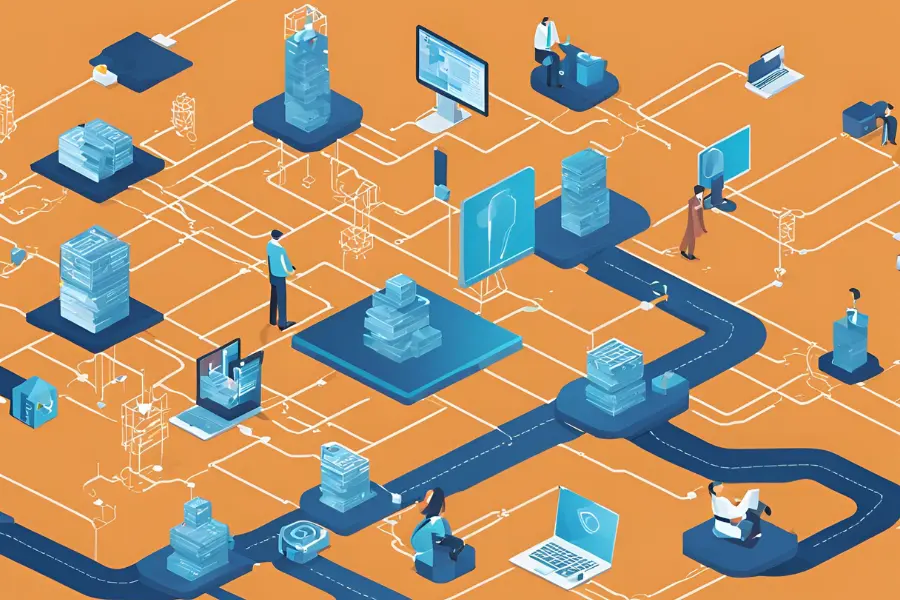Explore the Integration of Blockchain with AI for Enhanced Data Analytics
Blockchain technology with Artificial Intelligence (AI) integration has revolutionized data analytics by enhancing security, transparency, and the ability to derive meaningful insights from large datasets. By leveraging Python, developers can harness the power of Blockchain's decentralized ledger and AI's advanced analytics capabilities to address challenges such as data integrity, privacy, and scalability.

Understanding Blockchain AI Integration
Transparency in Blockchain systems provides a secure platform for storing and sharing data. It ensures data integrity through cryptographic techniques and consensus algorithms, making it ideal for recording transactions and maintaining an immutable audit trail. Artificial Intelligence (AI) encompasses machine learning algorithms and deep learning models that analyze vast amounts of data to uncover patterns, make predictions, and automate decision-making processes.
Key Benefits of Integrating Data Analytics with Blockchain and AI
Data Integrity and Transparency
Organizations use Blockchain technology to create secure and tamper-proof Decentralized Ledger datasets. Once the ledger is created, there cannot be any back-dated entries. Access is available only to authorized people with minimum exposure to the data, ensuring data security. AI tools that analyze the datasets are assured of data integrity, which enhances the accuracy of predictive models.
Enhanced Security
Cryptographic protocols are guardians of ledger data. Highly- developed and efficient AI detection tools use algorithms to monitor activities in real-time. The tools give out warnings or alarms when there is an attempt for unauthorized access or cyber threats.
Decentralized AI Models
Blockchain technology decentralizes and compartmentalizes data using AI models through a network of nodes. Data remains safe and secure without dependency on centralized servers with greater resilience to cyber attacks or phishing attempts.
Privacy and Data Ownership
Decentralized identity management solutions with Blockchain technology restrict data exposure, with compartmentalized data available only for the personnel who need to work on it. This controls data access and ensures data privacy. Data analytics AI tools can work within these compartments for analysis purposes. The secure networks ensure compliance with data protection regulations.
Smart Contracts for Automated Transactions
Smart Contracts are online automated agreements created based on predefined conditions. AI algorithms can utilize these contracts to execute tasks autonomously, such as processing data transactions or triggering analytics workflows.
Implementing Blockchain with AI Using Python
Smart Contract Development
Python frameworks for Blockchain like web3.py enable developers to create, deploy, and interact with smart contracts on Blockchain platforms such as Ethereum. These smart contracts can govern AI-driven transactions and data exchanges securely.
Data Encryption and Decryption
Python's cryptographic libraries (e.g., cryptography, pycryptodome) can encrypt sensitive data before storing it on the Blockchain. AI algorithms can then analyze encrypted data while maintaining data confidentiality.
Decentralized AI Marketplaces
Python scripts can facilitate the creation of decentralized AI marketplaces on Blockchain platforms. These marketplaces allow AI developers to monetize their models while providing transparent access to AI services for organizations seeking analytics solutions.
Federated Learning
Blockchain supports federated learning frameworks, where AI models are trained collaboratively across multiple nodes without sharing raw data. Python libraries like PySyft enable secure and privately federated learning implementations on Blockchain networks.
Real-Time Analytics and Reporting
Python-based AI algorithms can analyze real-time data streams recorded on the Blockchain, providing timely insights and actionable recommendations for decision-makers. Blockchain ensures the accuracy and auditability of these analytics results
Benefits of Python RPA in Customer Analytics
- Efficiency: Automation significantly reduces the time required for data collection, cleaning, and analysis.
- Accuracy: RPA minimises human error, ensuring consistent and reliable data processing.
- Scalability: Automated processes can easily scale to handle growing data volumes.
- Real-Time Insights: Continuous data updates enable real-time analytics.
- Enhanced Decision-Making: Deep, data-driven insights empower e-commerce companies to make informed decisions.
Real-World Applications
Supply Chain Management
Blockchain-enabled AI analytics optimize supply chain logistics, predict demand fluctuations, and ensure product authenticity through transparent tracking.
Healthcare
Blockchain secures patient data for AI-driven diagnostics and personalized treatment recommendations while preserving patient privacy.
Financial Services
AI-powered predictive analytics on Blockchain platforms enhance fraud detection, risk management, and automated trading strategies.
Challenges and Considerations
Scalability
Blockchain networks must scale to accommodate the computational demands of AI algorithms and large datasets.
Interoperability
Ensuring compatibility between different Blockchain platforms and AI frameworks remains a challenge for seamless integration.
Regulatory Compliance
Compliance with data protection regulations and legal frameworks (e.g., GDPR) is essential when handling sensitive information and AI-driven analytics on Blockchain networks.
Conclusion
Data analytics has generated interest since developers integrated AI tools into blockchain technology. This amalgamation created enhanced security in Blockchain data with decentralized processing capabilities. Blockchain technology has a Python-based structure which has several advantages for developers and enables robust solutions. These solutions form the basis of providing actionable insights to organizations while maintaining data integrity and privacy. The future of data analytics will see a pivotal role in Blockchain technology synergizing with AI tools. Learn more about Python and Javascript through an 8-week bootcamp from Lejhro at https://www.bootcamp.lejhro.com/data-analyst-course-training.
Active Events
Data Scientist Challenges One Should Avoid
Date: Feburary 25, 2025 | 7:00 PM (IST)
7:00 PM (IST) - 8:10 PM (IST)
2753 people have registered
Your Data Science Career Game-Changing in 2024: Explore Trends and Opportunities
Date: Feburary 28, 2025 | 7:00 PM (IST)
7:00 PM (IST) - 8:10 PM (IST)
2811 people have registered
Bootcamps
Data Analytics Bootcamp
- Duration:8 weeks
- Start Date:October 5, 2024
Data Science Bootcamp
- Duration:8 weeks
- Start Date:October 5, 2024
